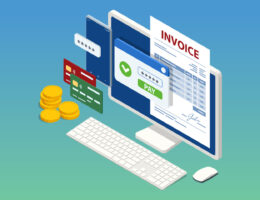Held in March 2022, the MIA Digital Month 2022 (MDM 2022) sought to drive MIA’s aspirations in supporting digital technology adoption by the accountancy profession in Malaysia. A virtual, month-long convention of digitalisation for the accountancy profession in Malaysia, MDM 2022 consisted of four complimentary webinars and was concluded with MIA’s AccTech Conference 2022.
Week 1 of MDM 2022 was kicked off with a webinar on Leading the Digital Transformation of the Accountancy Profession in Malaysia. The panel session featured the Chair, Lim Fen Nee and members of the MIA’s Digital Technology Implementation Committee (DTIC), Prof Dr David Asirvatham and Steven Chong Hou Nian and was moderated by Rasmimi Ramli, Executive Director, Digital Economy, Reporting & Risk of MIA.
Rasmimi presented on the Institute’s various digital initiatives to facilitate the accountancy profession’s digital transformation journey. Among the highlights of the digital initiatives are as follows:
• Technology Adoption by the Accountancy Profession in Malaysia Survey 2022
This is the third technology survey conducted by the Institute. The findings of the survey will provide insights to the impact of the pandemic on the accounting profession’s digital adoption and assist the Institute to further identify digital initiatives to move the profession forward. Highlights of the survey findings can be read here.
• Digital competency assessment
To initiate a digital adoption journey, companies should assess their readiness and competency in digitalisation and then develop a roadmap to move to the next level. The Digital Competency Maturity Model by the European Federation of Accountants and Auditors for SMEs (EFAA) enables such readiness and competency which can be explored further here.
• Guidance on Software & Software Vendor Database
The guidance and the database issued by the Institute is aimed to assist small and medium practitioners (SMPs) and small and medium enterprises (SMEs) in selecting software needed as well as selecting the right vendor for the implementation.
• Future accounting talent
The Report addresses the future skillsets of accounting graduates in Malaysia and the incorporation of emerging technologies in the accounting programmes to ensure future relevance. The Report further analyses the approaches to incorporate the emerging technologies into the accounting programmes as well as the delivery of those topics including who best to deliver them. To know more about this Report , kindly visit here.
• Conferences and webinars
The Institute has organised and continue to organise conferences and webinars as well as offer certifications related to digital technology which you could explore here .
• Funding
Various circulars have been issued to provide updates on the funding available to assist companies in embarking their digital adoption journey. The circulars are available here. You will need to login to access the circulars.
Among the key takeaways from the panel discussion are:
Technological trends
- Accountants must evolve and upskill to become future relevant. Future-proof accountants must be adaptable to the latest technology and capable to carry out high quality, high impact and high value tasks to contribute to decision making process and improve desired outcomes.
- Among the key technological trends that will impact the profession are artificial intelligence (AI), cybersecurity, data science and natural language processing (NLP).
- Technology applications such as collaborative tools and cloud-based applications are reshaping how accountants carry out their work and enables accountants to add value to their organisations. For example, with real-time information, accountants are able to contribute significantly to the risk management process.
Personal development
- Accountants need to be proactive to take advantage of the trainings and certification opportunities available from the Institute and other training providers. Accountants could also subscribe to digital-related contents that are available online. Less structured knowledge acquisition would include resources from social media or through networking within the accounting fraternity and business community.
- There are also micro credential courses offered by universities. For advanced level, accountants could also secure a post graduate program in relevant areas such as artificial intelligence.
- Tone from the top is important and leaders are advised to set the right example by developing their personal digital competencies and demonstrating digital leadership. It is also critical to start appointing digital champions within organisations and equip them with relevant skills and knowledge. The champions will then help leaders nurture business culture and mindset changes needed for successful digital transformation.
SMPs and SMEs
- Revenue model related technology is crucial for businesses to stay relevant and competitive. Digital adoption has become a key for sustainability and business continuity.
- Businesses should identify the drivers for technology adoption such as leveraging technology to improve the service delivery for the customers. Once the drivers are identified, businesses could develop a framework to allocate sufficient resources in implementing digitalisation in the business.
- The setting up of a proper governance structure and policy will assist companies to execute the digitalisation strategy efficiently.
Cybersecurity
- Accountants shall play a role in strengthening cybersecurity. Accountants need to be aware of the various cybersecurity tools that are available in the market. With this awareness, accountants are capable of providing inputs towards the controls and contingency plans in place. This will assist in preserving the integrity of data and minimise the financial impacts in the event something happens. Accountants need to collaborate with the cybersecurity experts, the information technology (IT) team and the risk team to execute a strategic and whole-of-enterprise approach to cybersecurity.
Future talent
- The Institute launched a report which outlines the findings and recommendations of a study on technology adoption within the accounting programmes/courses by the higher learning institutions (HLI) in Malaysia. The report identifies that among the emerging technologies for accounting programmes are artificial intelligence, data science, data analytics, cybersecurity, cloud computing and blockchain. It further analyses the approaches to incorporate the emerging technologies into the accounting programmes as well as the delivery of those topics including who best to deliver them. The report also calls for a collaborative effort involving key stakeholders as well as taking into consideration the challenges on technology infrastructure and funding. Read the report here.







